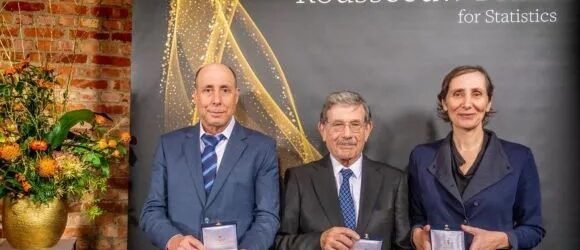The prestigious prize recognizes TAU innovations in statistical science.
On Dec. 3 the King Baudouin Foundation in Belgium awarded the prestigious Rousseeuw Prize in Statistics to Prof. Yoav Benjamini, Prof. Daniel Yekutieli, and Prof. Ruth Heller from the Department of Statistics and Operations Research at Tel Aviv University for their pioneering work on the False Discovery Rate (FDR). The $1 million prize, established as an equivalent of the Nobel Prize which does not include mathematical disciplines, recognizes outstanding contributions in statistics that profoundly impact science and society.
The ceremony was held at the Catholic University of Leuven, where protests by students and faculty members have called for a full academic boycott of Israeli universities. Outside the building where the ceremony took place, students distributed flyers advocating for a comprehensive boycott, similar to the policies adopted by other Belgian universities. Prof. Benjamini delivered a speech at the ceremony, emphasizing the importance of science as a bridge between societies. He called for the preservation of scientific collaborations, avoidance of boycotts, and protection of science from political interference. He also shared the story of the brutal kidnapping and murder of family friend Carmel Gat, noting the ongoing protests in support of a deal to release hostages and end the war, so far to no avail.
The prize was awarded to the researchers for their work enabling the scanning of numerous experimental results to identify meaningful findings while limiting the number of false discoveries. In their groundbreaking paper, Prof. Yoav Benjamini and the late Prof. Yosef Hochberg introduced the False Discovery Rate criterion. They expressed it mathematically, proposing a method to maximize the number of identified discoveries while maintaining a desirable FDR. Initially clashing with prevailing criteria, their paper remained unpublished for years, but today it is among the most cited papers in science. Prof. Yekutieli and Prof. Heller, former students of Prof. Benjamini, have continued to innovate and expand the FDR methodology independently and collaboratively. Their work has extended the applicability of the Benjamini-Hochberg FDR approach beyond the original paper, enabling its use for challenges in genomics and neuroscience and proposing methods to assess the reproducibility of scientific findings.
Prof. Yoav Benjamini commented: “The idea of the FDR originated from the need of medical researchers to examine numerous factors indicating treatment success. However, in statistics, once a new method is established in one research area, its impact can expand to others. Indeed, FDR methods are now widely applied in diverse fields such as genomics—where relations between tens of thousands of genetic markers of a specific disease are examined; neuroscience – testing which regions in the brain are activated when a certain task, such as face recognition, is performed; agriculture, economics, behavioral sciences, astronomy, and more. What these fields share is the need to scan massive amounts of possible results within mountains of data to identify significant discoveries”.
